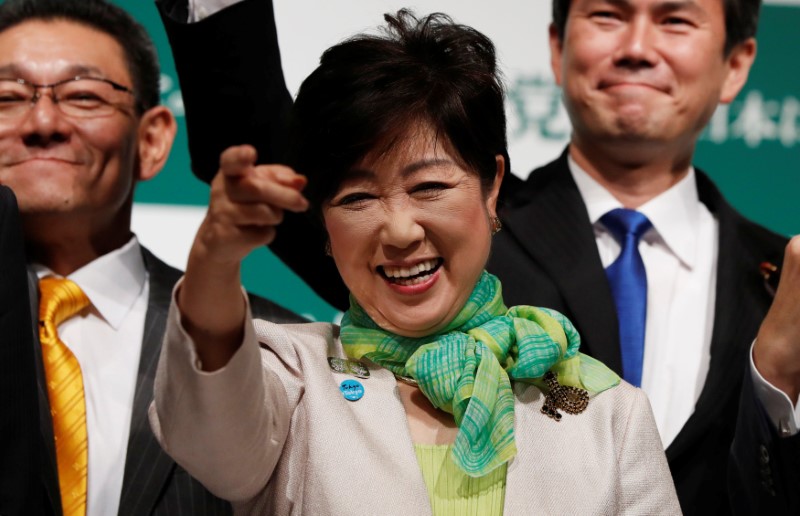
Tokyo Governor Yuriko Koike, the leader of her new Party of Hope, smiles as she raises her fist with her party members during a news conference to announce the party’s campaign platform in Tokyo, Japan, September 27, 2017. REUTERS/Issei Kato
October 18, 2017
By Linda Sieg
TOKYO (Reuters) – A new center-left party pledging to bring “bottom up” democracy to Japan may prove the surprise success story of an election on Sunday, although the party is forecast to win a mere sliver of seats compared to Prime Minister Shinto Abe’s ruling bloc.
Abe’s conservative Liberal Democratic Party-led coalition is on track to roughly match the two-thirds “super majority” it held in parliament’s lower house before dissolution, helped by divisions in the opposition camp and jitters over North Korea’s nuclear and missile programs, media forecasts say.
But the Constitutional Democratic Party of Japan (CDPJ) formed just this month could become the core of opposition to Abe’s LDP if, as some forecast, it challenges Tokyo Governor Yuriko Koike’s flashier conservative Party of Hope for the top opposition spot.
The CDPJ opposes Abe’s proposal to revise the post-war, pacifist constitution to clarify the ambiguous status of the military. Whether to revise the U.S.-drafted charter has long been a symbolic marker dividing Japan’s left and right, and Abe is expected to use his big win to push for amendments.
CDPJ founder Yukio Edano, 53, who grabbed the spotlight as Japan’s top spokesman during the 2011 Fukushima nuclear crisis, formed the CDPJ on the run after the main opposition Democratic Party’s leader stunningly decided the party would run no candidates and encouraged members to run on Koike’s slate.
Edano told Japanese media he was inspired by the “Stand up, Edano” tweets he received after the Democrats imploded.
Many Democrats jumped on the Hope bandwagon. Others either declined to join or were shut out after refusing to sign off on a hawkish security stance that echoes that of the LDP. Some joined Edano’s party, others are running as independents.
OUTDATED LABELS
A Sankei newspaper survey published on Tuesday predicted the CDPJ would get between 46 and 60 seats, compared to initial estimates that about 30 of its 78 candidates would be elected.
That compared to 39 to 57 seats for the Party of Hope, which is running 235 candidates. [http://tmsnrt.rs/2kGwCm5]
A Kyodo news agency survey released on Wednesday also forecast the CDPJ could become the biggest opposition group.
If so, that would suggest voters unhappy with Abe are seeking not a conservative replica of the LDP but a more liberal alternative, political analysts said. The failed Democratic Party was a fractious mix of liberals and conservatives, saddled with an image of incompetence after a rocky 2009-2012 rule.
“Almost all parties have been conservative and there is no party for liberal voters to vote for,” said University of Tokyo professor Yu Uchiyama. “If this party is successful in attracting liberal votes, there could be a prospect to do well.”
Edano, however, eschews what he calls outdated labels such as “liberal” or “left”, terms often associated with Cold War-era socialists or communists that can turn off mainstream voters.Unlike the more authoritarian LDP, he stresses commitment to individual civil rights, rather than obligations to the state, and wants to redistribute wealth to create a more equitable society.
“I want to take a first step toward creating a ‘bottom up’ society … toward a trend that is neither left, nor right, but moves forward,” Edano said during a debate this month.
STRUGGLE TO DIFFERENTIATE
The lack of preparation time, and a shortage of cash and candidates will be formidable obstacles for the CDPJ to overcome.
It could also struggle to differentiate its economic policies from those of the LDP, which has long been more center-left than right when it comes to bread-and-butter issues.
Edano’s group wants to put off a sales tax hike and exit nuclear power. The LDP says it will keep nuclear power as a key energy source and raise the sales tax in 2019 but divert revenue to education and child care from repaying public debt.
Both parties promise equal pay for equal work, higher wages for day care and elder care workers and more financial support for education, although they differ on details.
A Reuters poll published Wednesday showed Japanese companies overwhelmingly want Prime Minister Shinzo Abe’s ruling coalition to stay in power but about two-thirds want it to lose seats. The poll showed significant opposition in the corporate world to Abe’s plans to raise the sales tax and to delay bringing down the fiscal deficit.
“Abenomics would be comfortably left-of-center in most developed democracies,” said Tobias Harris, an analyst at advisory firm Teneo Intelligence.
A healthy showing by the CDPJ could lure more lawmakers to its ranks after the election, although low voter turnout could diminish its performance as could competition with the Japanese Communist Party on the left.
“If the CDPJ comes in second, in a couple of months they will have grown and become the core of a new center-left opposition party,” said Chuo University professor Steven Reed.
(Reporting by Linda Sieg; Editing by Bill Tarrant)

